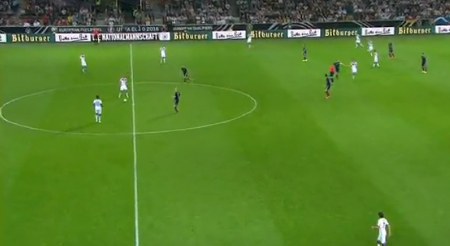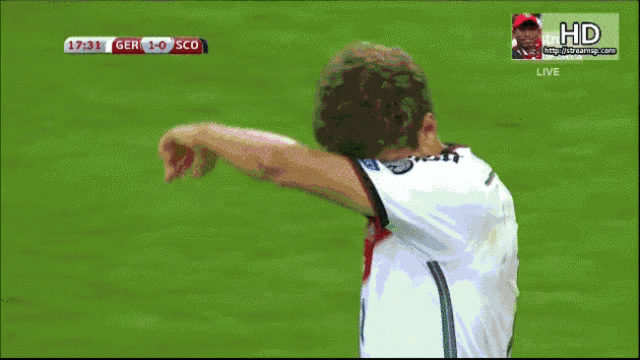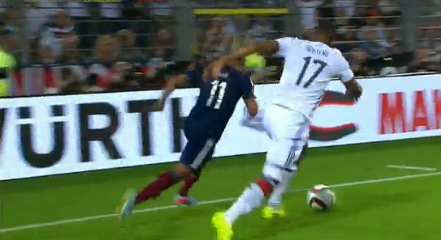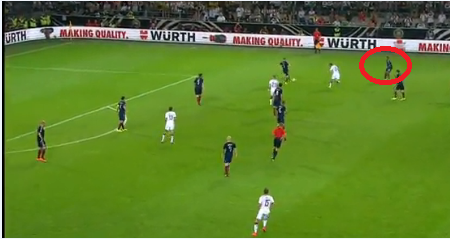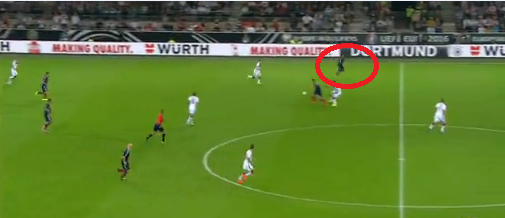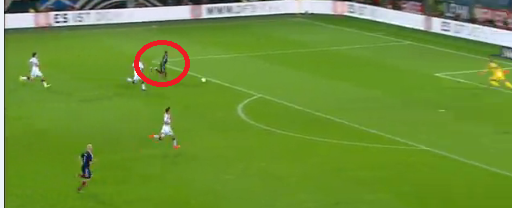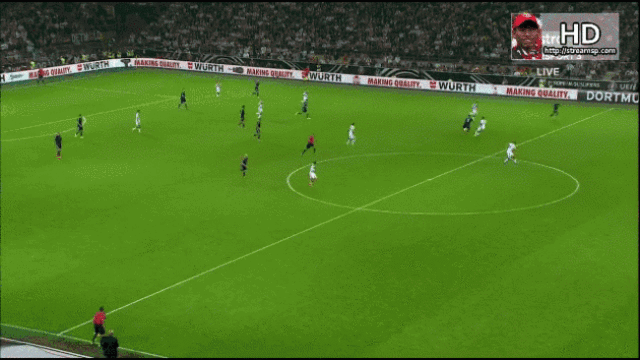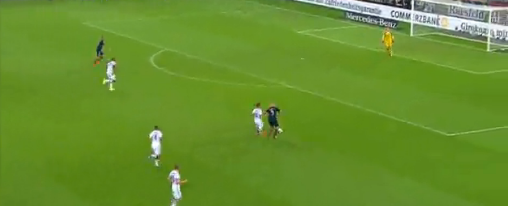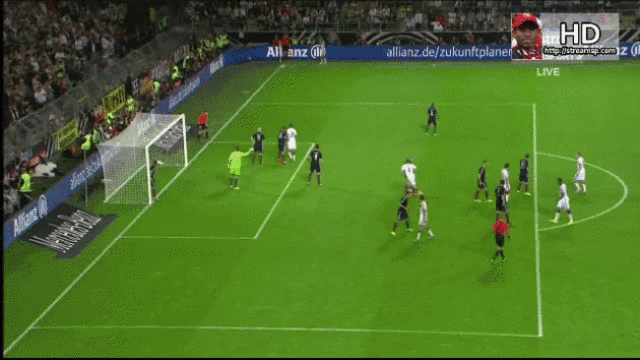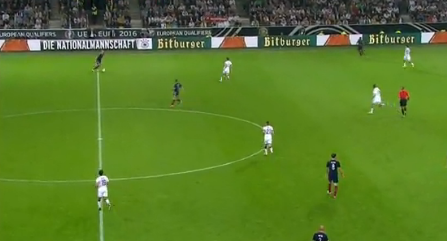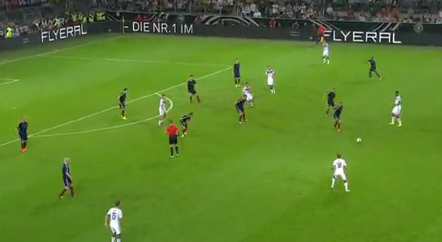IRELAND TRAVEL TO play Germany on Tuesday, with the hosts widely regarded as overwhelming favourites to win the game, despite suffering a shock 2-0 loss against Poland last night.
And though they are the current world champions, aside from Poland, other teams at a relatively similar level to Ireland, such as Scotland, Algeria and Ghana have all caused them significant problems in the recent past.
Ahead of Ireland’s upcoming crunch game, we’ve therefore decided to look closely at Germany’s recent matches, with a particular focus on the Scottish tie.
Though the Germans undoubtedly possess the more talented players on paper when compared with the Irish, the same could said for the expensively assembled Manchester United team that recently lost 5-3 to newly promoted Leicester.
Hence, Martin O’Neill and his side must approach the game with a positive mindset, and provided the former Celtic coach adopts intelligent tactics and manages to conjure big performances from his players, then Ireland have every chance of significantly troubling the Germans.
Alternatively, should they allow the Germans plenty of space and if they fail to show sufficient self-belief, then Martin O’Neill’s men could be on the end of a similar result to the 6-1 hammering they suffered against the same opposition two years ago during the Giovanni Trapattoni era.
The Irish could do worse than study the Scots’ performance last month against Joachim Löw’s side. They may have lost 2-1, but they missed more than a couple of excellent chances, while the Germans were fortunate to not see at least one of their players sent off.
Despite the formidable prospect of playing the world champions, the Scots were quietly confident going into the a game, having enjoyed a six-match unbeaten run prior to the contest.
Moreover, coach Gordon Strachan emphasised the feel-good factor, speaking in a palpably positive tone ahead of the game.
“I can sense that the players are really looking forward to this game. There seems to be no fear. I like that,” he told reporters.
“They know they have to work hard to get a result and that has been shown in the training this week.”
Formations
Both teams played a variation of the 4-2-3-1 formation, though Scotland were obviously far less adventurous than their opponents.
Germany started with Benedikt Höwedes — who had played most of the World Cup in an unnatural full-back role — at centre-half. Other relatively unfamiliar names, such as Sebastian Rudy and Erik Durm, slotted in in the full-back positions, to compensate for the loss of defenders such as Philipp Lahm and Per Mertesacker to retirement.
With Bastian Schweinsteiger and Sami Khedira both injured (as they will be for the Ireland game as well), Toni Kroos and Christoph Kramer played in front of the back four. Meanwhile, their star-studded attack featured Mario Götze in the most advanced attacking position, with Thomas Müller, Marco Reus (who is out injured for the Ireland match) and André Schürrle all operating just behind the main striker.
Scotland placed faith in Charlie Mulgrew to partner the vastly experienced Darren Fletcher in midfield, with James Morrison given more license to get forward and link up with lone frontman Steven Naismith. Ikechi Anya and Barry Bannan also supported Naismith from the flanks, while Gordon Marshall was preferred to Alan McGregor in goals.
Calm start
What was striking about Scotland’s first-half performance at Signal Iduna Park in Dortmund was the level of discipline and tactical intelligence they displayed early on.
As expected, the Scots defended in numbers and broke with speed on the rare opportunities they had on the counter attack. Check out the graphic below, which illustrates a classic example of how the visitors were set up early on, with every single Scottish player in his own half, thus denying Germany space for their world-class attackers to exploit.
Germany were clearly getting frustrated very quickly, as some elementary errors and a number of misplaced passes owing to Scottish pressure began to creep into their game in the early stages.
However, despite not having created many chances, Germany went ahead on 18 minutes, when a loss of concentration involving Alan Hutton and Russell Martin allowed Thomas Müller to ghost in between the two Scottish defenders and head home expertly. It was cruel on Scotland, who had seldom looked like conceding up until that point.
Yet what was even more laudable from a Scottish perspective was the manner in which they reacted to the opening goal. With Germany having broken their resistance, lesser teams would have crumbled at this point, but Gordon Strachan’s side continued to play exactly as they had before, refusing to panic and showing great discipline and intelligence by refraining from becoming overly attack-minded as a result of the early setback.
German high-line is punished again as Anya runs riot
There were several examples in the World Cup of supposedly weaker teams continually exposing Germany’s high line.
None of the German defenders are particularly fast (even Mats Hummels, who was missing from the Scotland game, but will likely be available for the Ireland clash), and this issue has been one of their most obvious weaknesses, especially as they invariably tend to adopt a high line that gives pacy opposition strikers plenty of space to run into.
This problem was evident in their 2-2 World Cup draw with Ghana, in addition to their 2-1 extra-time win over Algeria, both of which can be seen (in highlights form) below.
Scotland clearly noticed this weakness, as they also consistently illustrated the flaws in Germany’s backline.
While the hosts’ build-up play was slow and methodical, the Scots opted for a less sophisticated and more direct approach.
The visitors clearly knew they weren’t going to win the possession battle and often dropped off and allowed the hosts’ back four ample time on the ball — the result being that Scotland saw just 31% of the ball over the duration of the contest.
Yet the visitors were far from toothless in attack, and most of their best chances actually stemmed from German attacks, where the ball was given away, allowing Strachan’s side to break quickly.
Usually the strategy was a simple long ball. If they were lucky, the Scots would win the ensuing challenge up front, and one of either Steven Naismith or Ikechi Anya would pick up the loose ball.
Anya, in particular, caused chaos. An early warning signal occurred in the first half when he dashed past Jérôme Boateng and put in a dangerous cross, prompting the German defence to put in a desperate last-ditch block to prevent a shot on target.
Early in the second half, the Watford man exposed the German defence’s lack of pace once more and again eluded the challenge of Boateng, only for Scotland to similarly fail to make the most of his subsequent cross.
Then, finally, on 66 minutes, Anya punished the Germans’ failure to heed the warning signals by scoring the equaliser, courtesy of another rapid Scotland counter-attack.
Check out the images below and you’ll notice two things — the sheer pace of Anya and the amount of space he is afforded to run into, as Germany are completely exposed on the counter.
A German attack breaks down, Anya gains possession and plays a simple one-two with substitute Steven Fletcher, and all of a sudden, the speedy winger is through on goal.
You’ll notice from the image below that German goalkeeper Manuel Neuer, who is famed for his ability to anticipate attacks before they even happen, is unusually slow off his line. Though he may have lost concentration a little owing to the paucity of goalmouth action he had to deal with before then, more than anything else, it’s a tribute to the quick-fire nature of the Scottish attack that he remains prone to his goal-line until it’s too late.
Speaking of Neuer, though he is widely described as the best goalkeeper in the world and is praised in particular for his ability to sweep up in front of the defence, he too can get it wrong on occasion.
Watch the video below from the last Germany-Ireland clash from about 5.05 onwards, where he fails to show his usual composure in quelling an attack, and almost costs his side a goal as a result.
Also, Neuer was blatantly at fault for Poland’s first goal last night, as he badly misjudged the cross that enabled Ajax star Arkadiusz Milik to head home for the opener.
http://vine.co/v/OAjljDD6w6x
Of course, the clips above are anomalies, as the Bayern Munich stopper is normally highly reliable. By contrast, the Germany defence has long been considered vulnerable, and Ireland have pacy players such as Aiden McGeady and Shane Long, who can potentially cause serious problems.
Germany enjoy rub of the green
In addition to Scotland passing up a host of chances, Germany were also fortunate to benefit from a series of highly favourable decisions by the officials.
In the first half, their defence failed to deal with a routine long ball, as Höwedes appeared to drag Naismith back after 19 minutes. Had it been a different referee, Höwedes (who misses the Ireland game through injury) could easily have been sent off.
Moreover, in the second half, Durm was penalised for dragging back Steven Naismith, but to the chagrin of all the Scots watching, only received a yellow when he appeared to be the last man.
The Germans surely can’t be expecting that such good fortune will get them out of jail for a second time when they meet Ireland.
Stopping Müller key to stopping Germany?
With an incredible 10 goals in the last two World Cups, there is no doubt that Thomas Müller is a pivotal player for Germany.
The Bayern Munich star ultimately made Scotland pay for their lax defending, scoring a match-winning brace with goals that emphasised his poacher’s instincts.
One of Müller’s key assets, which Ireland need to be especially weary of, is his heading ability. The 25-year-old has an incredible spring that enables him to out-jump the tallest of defenders, while he is also lethal in directing the ball exactly where he wants it to go.
What also makes him so difficult to stop — somewhat ironically given his prolific record — is the fact that he rarely plays as a traditional striker. Instead, he usually operates as one of the attacking trio behind the most advanced attacker.
Müller’s creativity and excellent passing ability means he is often needed in midfield or on the flanks. Consequently, opposition defences are usually reluctant to man-mark the star for fear of being dragged out of position on a regular basis. This factor also explains his ability to ghost into the box at the last minute, unbeknownst to defenders, as he did so effectively for the first goal against Scotland, while he took the second rather well too (see below).
Though Germany have several talented players, Ireland will need to keep a particularly close eye on Müller. Whoever is delegated with that responsibility (probably either John O’Shea or Marc Wilson) cannot afford to give him the freedom that Scotland’s back four allowed, and should they succeed in keeping him quiet, then the German attack will be a significantly less daunting force as a result.
Germany weaker than usual?
Though Germany remain a highly accomplished outfit, the team that plays Ireland is ostensibly weaker than the side that won the World Cup. Of the 11 that started the final last July, at best six will play on Tuesday, while other key players such as Per Mertesacker, Sami Khedira and Marco Reus also won’t be available.
While Germany have more strength in depth than most national teams, against Scotland — without Khedira and Schweinsteiger – they failed to show their usual slickness in midfield.
Toni Kroos had one of his less influential games, while Kramer was also relatively ineffectual, all too often looking for the easy sideways pass, when Germany were crying out for greater imagination and penetration.
Further forward, Schürrle also showed why he has never really established himself as a regular starter at Stamford Bridge. Like Götze to a certain degree as well, he was sloppy in possession, and more often than not, clumsy with his final ball.
That said, the Chelsea player has an admirable work-rate as well as an occasional capacity for the sublime, which was most memorably evident when he brilliantly set up Götze’s winning goal in the World Cup final.
Moreover, check out the pic below and notice how it starkly contrasts with the very first image in this article — now, every German player is in their own half.
The comparison epitomises how the tide turned completely in the second period, leading the Scots to dominate its early stages.
Capitalising on the Germans’ failure to meet their usual high standards, Scotland grew in confidence and eventually scored a deserved equaliser.
German over-confidence?
Of course, exhaustion eventually got the better of Gordon Strachan’s side, leading them to concede a sloppy second just five minutes after getting back into the match, while the game ended rather tamely, with the Germans closing the match out comfortably. There was a sense of arrogance, or perhaps even over-confidence about Löw’s team’s play in the dying stages, as highlighted in the form of Götze’s indulgent flick giving possession away late on, when they still did not hesitate to pile forward (see image below) despite defending a somewhat tenuous-looking lead.
Furthermore, while still holding a slender advantage with three minutes to go, the hosts had no hesitation sending Höwedes up for a corner, which could be construed as brave or complacent depending on your perspective. If Martin O’Neill’s men have more in the tank during the dying stages than Scotland did, they could surely benefit from their opponents’ tendency towards a cavalier approach irrespective of the circumstances.
Conclusion
As opponents go, they don’t come much tougher than Germany, even if Löw’s team will be lacking some of their best players when the Irish team visit, while they will also still be reeling to extent after last night’s shock defeat to Poland.
However, the Scotland game among others shows that the world champions are far from infallible. Consequently, with the right attitude and set-up, Ireland have every chance of causing Germany problems as a result of the weaknesses outlined above.
Of course, Martin O’Neill’s men are patently inferior to their opponents on a technical level, but should they perform to their maximum level, they have the ability to at least attain one point from the game if not all three.

